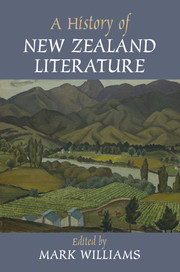Book contents
- Frontmatter
- Contents
- Notes on Contributors
- Acknowledgments
- Introduction
- PART I 1760–1920
- 1 A World of Waters: Imagining, Voyaging, Entanglement
- 2 Early Māori Literature: The Writing of Hakaraia Kiharoa
- 3 Samuel Butler's Influence
- 4 Maoriland Reservations
- 5 Katherine Mansfield: Colonial Modernist
- PART II 1920–1950
- PART III 1950–1972
- PART IV 1972–1990
- PART V 1990–2014
- Index
1 - A World of Waters: Imagining, Voyaging, Entanglement
from PART I - 1760–1920
Published online by Cambridge University Press: 05 April 2016
- Frontmatter
- Contents
- Notes on Contributors
- Acknowledgments
- Introduction
- PART I 1760–1920
- 1 A World of Waters: Imagining, Voyaging, Entanglement
- 2 Early Māori Literature: The Writing of Hakaraia Kiharoa
- 3 Samuel Butler's Influence
- 4 Maoriland Reservations
- 5 Katherine Mansfield: Colonial Modernist
- PART II 1920–1950
- PART III 1950–1972
- PART IV 1972–1990
- PART V 1990–2014
- Index
Summary
The final section of John Savage's Some Account of New Zealand (1807), the first published book to take the islands of Aotearoa-New Zealand as its subject, recounts the voyage of Moehanga, the first known Māori to travel to England. We read of Moehanga singing on his first evening on board ship; of Savage's speculation that after weeks at sea Moehanga may have believed ‘that he had embarked on a world of waters’; of Moehanga's careful observations and questioning at each port; and of his frequent laughter at new sights. Savage's account of Moehanga's voyage, an event that in itself has been described as a mere ‘sideshow’ to the broader history of contact, empire, and the eventual colonisation of Aotearoa-New Zealand, evokes the complexity of stories of cultural encounter and entanglement that are the subject of this opening chapter. The Moehanga narrative suggests new directions for both stories of the great migrations that had brought Māori to Aotearoa from Hawaiki, and for centuries-old European imaginings of Terra australis incognita, the mythic Great Southern Continent. The mere fact of Moehanga's mobility reminds us that the narratives of first contact and encounter went in multiple, complex directions and reached far beyond accounts of Europeans arriving on Pacific shores. Savage's version of Moehanga's story also highlights the way in which first encounters could be characterised by mutual fascination, wonder, and at times intense pleasure, as well as by misunderstanding and confusion on both sides – and that they were frequently insulting, uneven, and at times fatal. The narrators and characters in the texts discussed in this chapter are in some way all at sea, embarked on a new ‘world of waters’ that they neither fully comprehend nor see the end of. This chapter focuses on the imaginings of, from, and about this unstable location.
Most of the pre-Treaty texts in English discussed here are works of nonfiction, structured by a journey, and not strictly speaking literary. They range from the body of European writing that emerged from Pacific voyages of exploration, to the narratives of visiting missionaries, soldiers, whalers, and artists. Until relatively recently they have been treated primarily as historical sources, or as examples of ‘the ways in which New Zealand was textualized’ in preparation for cultural colonisation.
- Type
- Chapter
- Information
- A History of New Zealand Literature , pp. 17 - 30Publisher: Cambridge University PressPrint publication year: 2016
- 1
- Cited by



